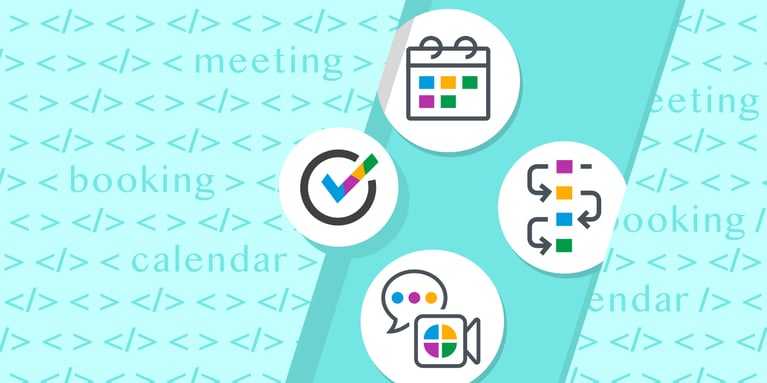Cut through the noise with OnceHub’s simple no code online booking system

Simplicity is a beautiful, underappreciated thing. There is a lot of noise being generated at near constant frequency and having the literacy and acumen to navigate our increasingly complex digital spaces is a skill unto itself.
Simple online booking system
Look only to social media feeds, shopfronts and news aggregators to see how utterly cluttered our portal into the world wide web can become. In a world where every website, pop-up and algorithm is constantly vying for your attention and trying to snag you into their funnel, isn’t saying no to noise and simplifying our own spaces the most revolutionary thing we can do?
There seems to be a growing need to communicate as much as possible so you appeal to as many as possible and we don’t like where this is going. If we’re all saying and doing the most by trying to be everything at once, the message and core intent seems to become very muddled.
We’re keen proponents of a pared back, streamlined approach to scheduling that is complex in its capability and simple in its execution. If you’re someone that veers toward minimalist sentiments in your everyday life, shouldn’t those same considerations apply to your booking pages? Let’s take a look at why a messy booking page can be a serious detriment to the digital experience you’re looking to create:
Cluttered and complicated booking pages can have negative impacts on businesses in several ways
Lack of a simple booking system leads higher abandonment rates:
When users encounter a cluttered and complicated booking page, they may become frustrated or overwhelmed, leading to higher abandonment rates. Users may choose to leave the page without completing their bookings, resulting in lost potential revenue for the business and very slim chances of them returning.
Decreased conversions could be due to absence of a simple booking system:
Complicated booking pages can hinder the conversion process. Users may find it difficult to navigate through complex forms, unclear instructions, or overwhelming options. This can lead to a decrease in conversion rates as users may abandon the process before completing their bookings or opt for alternative, more user-friendly options.
Cluttered booking systems could lead to negative brand perception:
A cluttered and complicated booking page reflects poorly on the overall brand image and user perception. Users may associate the cumbersome experience with a lack of professionalism, attention to detail, or user-centric approach. This negative perception can harm the business's reputation and deter potential customers from engaging with the brand in the future.
Missed Opportunities for Upselling or Cross-selling:
A cluttered booking page may fail to effectively showcase additional products, services, or upgrades that could enhance the customer's experience or increase the business's revenue. When users are overwhelmed or confused, they are less likely to explore or consider these additional offerings, resulting in missed upselling or cross-selling opportunities.
Limited Mobile Accessibility:
With the increasing use of mobile devices for online activities, a cluttered and complicated booking page may not be mobile-friendly. Mobile users may struggle with small screens, complex forms, and slow-loading pages, leading to a poor mobile experience.
Overall, a cluttered and complicated booking page can negatively impact a business's bottom line by leading to higher abandonment rates, decreased conversions, negative brand perception, missed upselling opportunities, and limited mobile accessibility. Simplifying the booking page with the help of simple online booking system can help solve these issues and improve the overall user experience.
Here’s why we think a simple online booking system will always be superior
Improve user experience by using a simple booking system:
Simplifying the booking process improves the overall user experience, period. By reducing the number of steps and minimizing complex elements, users can navigate the page easily and complete their booking more quickly. This leads to higher user satisfaction and a lower likelihood of users abandoning the booking process.
Clarity and focus with an easy booking pages:
A simplified approach helps to prioritize the essential information and actions on the booking page. By removing unnecessary clutter, distractions, or confusing elements, users can focus on the key details, such as selecting dates, choosing options, and completing the necessary fields. Be as clear as you would expect as a user, and you should be able to cut through the noise and create some clarity.
Simple online booking pages have faster loading times:
A simplified booking page tends to have fewer elements and lighter code, resulting in faster loading times. This is important because users often expect websites to load quickly, and any delays can lead to frustration and abandonment. A fast-loading page improves the overall user experience and increases the likelihood of users completing their bookings.
Simple booking systems can reduce your cognitive load:
Complex or overwhelming pages with too many options and information can be mentally taxing, leading to decision fatigue and decreased user engagement. A simplified approach makes the process more intuitive and less mentally demanding, making it easier for users to make decisions and proceed with their bookings.
It's important to note that while a simplified approach is generally beneficial, it's crucial to strike the right balance. The page should provide enough relevant information and options to meet user needs without overwhelming them. Usability testing and feedback from users can help optimize the booking page for the best user experience.
Your own no code booking system
To get started creating your own intuitive and efficient no code meeting and routing solutions, sign up for free today and see what a smart approach to scheduling can do for you and your business.
Better scheduling starts here
No credit card required
